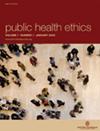从卫生科学到老年科学:公共卫生必须超越“民间生物学”
IF 2
3区 哲学
Q2 ETHICS
引用次数: 1
摘要
民间生物学是指人们对生物世界的日常理解。二十世纪初的公共卫生先驱C.-E.A Winslow(1877–1957)和他的导师H.Biggs(1859–1923)将公共卫生概念化为一门“可购买”的科学,用于预防不利的经济和生活条件下的疾病和死亡。他们的想法是塑造公共卫生“抗击疾病”战略的基础(温斯洛,1903),这一战略在预防传染病早期死亡风险方面非常成功,并最终扩展到抗击晚期慢性疾病(如癌症)。然而,从卫生科学的角度来看,公共卫生的最初框架是基于民间生物学的前提,即必须减少不适感,以便将公共卫生干预措施引向提高21世纪老年人生活质量的目标。确定并批判了卫生科学“对抗疾病”的三个民间生物学前提:(i)认为健康是人体机制的“正常”条件,而疾病是“不必要的”;(ii)认为疾病的直接原因是公共卫生干预措施可以改变的唯一可改变的风险因素;以及(iii)相信生物衰老的速度是普遍的。本文章由计算机程序翻译,如有差异,请以英文原文为准。
From Sanitation Science to Geroscience: Public Health Must Transcend ‘Folkbiology’
Folkbiology refers to people’s everyday understanding of the biological world. The early twentieth-century pioneers of public health C.-E.A Winslow (1877–1957), and his mentor H. Biggs (1859–1923), conceptualized public health as the ‘purchasable’ science of preventing disease and death from unfavorable economic and living conditions. Their ideas were foundational in shaping public health’s strategy of a ‘war against disease’ (Winslow, 1903), a strategy that was very successful in preventing the early-life mortality risks from infectious diseases, and was eventually extended to combating the chronic diseases of late life (like cancer). However, the initial framing of public health, through the lens of sanitation science, was predicated upon folkbiological premises that geroscience must abate in order to direct public health interventions toward the goal of improving the quality of life for older persons in the twenty-first century. Three folkbiological premises of sanitation science’s ‘war against disease’ are identified and critiqued: (i) the belief that health is the ‘normal’ condition of the human mechanism and disease ‘unnecessary’; (ii) the belief that the proximate causes of disease are the only modifiable risk factors public health interventions can alter; and (iii) the belief that the rate of biological aging is universal.
求助全文
通过发布文献求助,成功后即可免费获取论文全文。
去求助
来源期刊

Public Health Ethics
PUBLIC, ENVIRONMENTAL & OCCUPATIONAL HEALTH-MEDICAL ETHICS
CiteScore
3.10
自引率
9.50%
发文量
28
审稿时长
>12 weeks
期刊介绍:
Public Health Ethics invites submission of papers on any topic that is relevant for ethical reflection about public health practice and theory. Our aim is to publish readable papers of high scientific quality which will stimulate debate and discussion about ethical issues relating to all aspects of public health. Our main criteria for grading manuscripts include originality and potential impact, quality of philosophical analysis, and relevance to debates in public health ethics and practice. Manuscripts are accepted for publication on the understanding that they have been submitted solely to Public Health Ethics and that they have not been previously published either in whole or in part. Authors may not submit papers that are under consideration for publication elsewhere, and, if an author decides to offer a submitted paper to another journal, the paper must be withdrawn from Public Health Ethics before the new submission is made.
The editorial office will make every effort to deal with submissions to the journal as quickly as possible. All papers will be acknowledged on receipt by email and will receive preliminary editorial review within 2 weeks. Papers of high interest will be sent out for external review. Authors will normally be notified of acceptance, rejection, or need for revision within 8 weeks of submission. Contributors will be provided with electronic access to their proof via email; corrections should be returned within 48 hours.
 求助内容:
求助内容: 应助结果提醒方式:
应助结果提醒方式:


